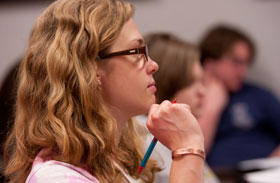(January 22, 2014)
Liberal arts graduates earn more at career peak
SHREVEPORT, LA — Workers with liberal arts bachelor's degrees earn more at their career peak than those with professional or pre-professional undergraduate degrees, according to a new study. The report How Liberal Arts and Sciences Majors Fare in Employment was released today.

"The value of a degree in the liberal arts and sciences is one of the best kept secrets in higher education," said Matt Bailey, Senior Director of Marketing & Communication at Centenary College of Louisiana. "Many institutions today offer preparation for starting a job in a particular field. At Centenary, we are preparing our graduates for success throughout their careers as they advance to their third or fourth or fifth job. A liberal arts education develops leaders who can overcome challenges, adapt to the changing world, and weather economic shifts to achieve career success over decades. So the findings of this study come as no surprise to us."
The report responds directly to families' concerns about the value of a higher education, especially one in a liberal arts or sciences discipline. The study found that four out of five employers seek candidates who have broad knowledge in the liberal arts and sciences. Ninety-three percent of employers agree that critical thinking and problem-solving skills, which are at the center of a liberal arts education, are more important than a worker's undergraduate major. The study also reported that the unemployment rate for both recent liberal arts graduates and mature workers with liberal arts degrees is well below the national average.
"This report mirrors what those who teach in liberal arts institutions have argued for some time," said Centenary Professor of Economics David Hoaas. "An education rooted in the liberal arts not only makes individuals productive global citizens, but it also leads to increased lifetime earnings. The world needs and has always needed individuals who have a firm foundation in critical thinking skills."
The report was published by the Association of American Colleges and Universities (AAC&U) and the National Center for Higher Education Management System (NCHEMS) with support from the National Endowment for the Humanities, the Spencer Foundation, and the Teagle Foundation. More information can be found online at www.aacu.org.
